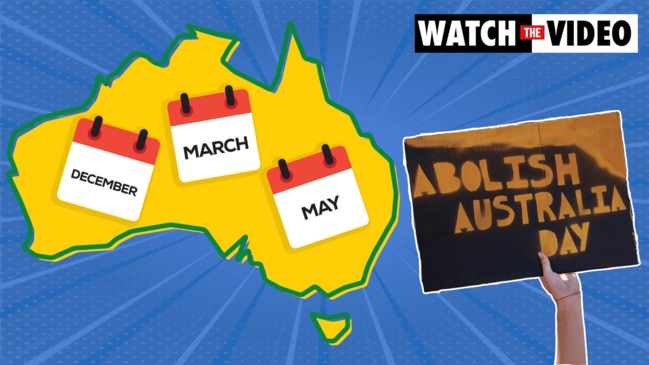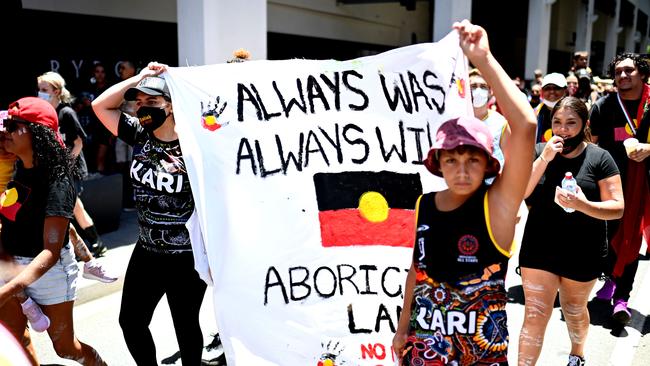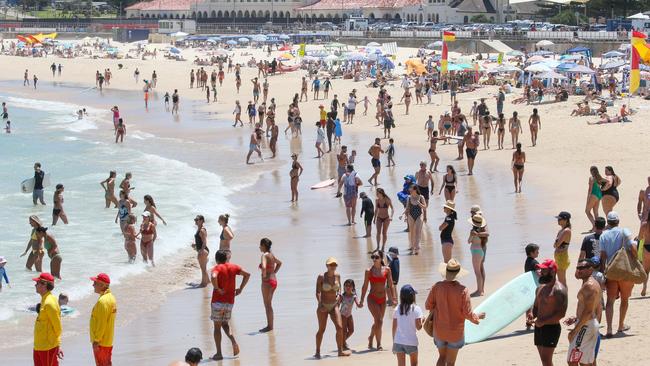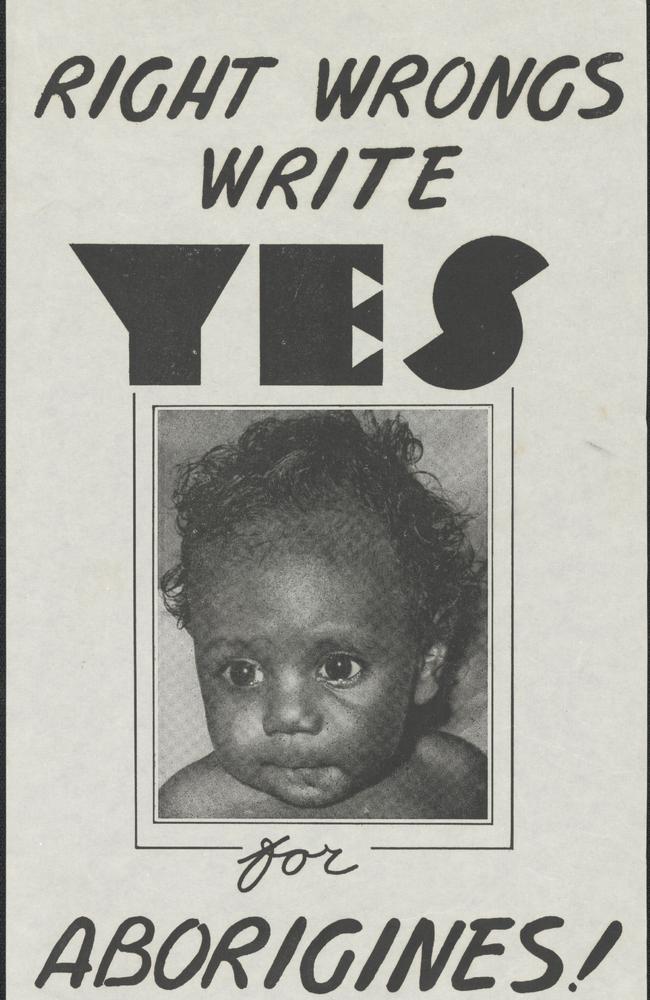Australia Day 2022: Alternative dates for our national holiday
As momentum gains to change the date of Australia Day, here are some alternative dates that our national holiday could be celebrated.

National
Don't miss out on the headlines from National. Followed categories will be added to My News.
This January 26 marks 234 years since the First Fleet landed in Port Jackson.
And while it’s long been pegged as a day of celebration and coming together, for many Australians the day has become a symbol of inequity and institutionalised harm.
In the last six years, the public holiday has seen thousands of Aussies take to the streets in protest against it – with the Invasion Day rallies calling for, among other things, a changing of the date to reflect that, for many, January 26 represents more than the beginning of British colonialism with the arrival of the First Fleet at Sydney Cove.
Despite the push, an overwhelming number of Australians still don’t see the need to change the date. But what they may not understand is that we haven’t always celebrated our nation on January 26.
Here are just some the dates on which we could celebrate Australia Day.
January 26 is not a day for celebration – that’s why news.com.au is campaigning to change the date of Australia Day, so we can celebrate the best country in the world, without leaving anyone behind.

January 1
One of the most logical – if not the most logical – alternatives to January 26 is New Year’s Day, when the Commonwealth of Australia came into being in 1901 and Australia, as one “united” nation, was technically born.
Aside from the historical significance of the date, “every new year people make resolutions, often with the hope to be a better person in some way”, historian and writer Dr Aron Paul wrote for the ABC in 2018.
“Australia, as the country where so many people reinvent themselves and seek a new life – from those waves of convicts, to more recent migrants – could have no better date to celebrate its hopes as well as its achievements than the first day of every year.”
January 26
Despite the movement in recent years, polling finds that the overwhelming majority of Australians still support keeping Australia Day on January 26.
Last year, a news.com.au survey found that, out of 29,850 voters, 47 per cent have no interest in changing the date.
A different survey, released by the Institute of Public Affairs, suggested 69 per cent of Australians want the date to remain unchanged, with Indigenous affairs commentator and Australian Capital University researcher, Dr Anthony Dillon, arguing the “average Aussie just wants the day left alone”.
“Because there is absolutely nobody who is celebrating genocide on that day,” he said.
“They’re having BBQs and throwing a frisbee.”
January 31
Moving the date to the last day of the month keeps it in January, but five days on from January 26.
It wouldn’t be the first time something in the ballpark of Australia Day had been moved either – while not holding quite the same level of significance, the date of Triple J’s Hottest 100 countdown was changed a few years ago to depoliticise the countdown and make it available to all Aussies.

First Monday in February
One of the best part of any public holiday is when it falls on a Friday or Monday, resulting in the most blessed of three-day events: a long weekend.
While we’re not always guaranteed one of these when Australia Day falls on January 26, it’d be a sure thing each year if the date was moved to first Monday in February.
Plus, it’d still be in the peak of summer, so the usual activities could be enjoyed.
May 8
The movement to change the date to May 8 has only picked up momentum in recent years, and unlike some of the other options here, has no real significance … except that it looks and sounds like “May8” (mate).
“We are proposing May 8 because giving consideration to all Australians, and all [of] the history of Australia will make Australia Day more inclusive, and Australia a greater Nation for it,” the May8 website reads.
“Being a Mate crosses cultural, community, religious and racial barriers … we all have a mate and we are all somebody’s mate, so let’s join together and respect the individual contribution we make, and that our communities make to Australia as we celebrate Australia Day on May 8, Mate!”
May 9
May 9 marks the day in 1901 when we became a self-governing federation – but it’s significant for a number of other reasons as well.
“In 1927, when the Parliament shifted to Canberra (from Melbourne); and finally, in the bicentennial year of 1988, when the current Parliament House was opened,” Fairfax’s former national affairs editor, Mark Kenny, pointed out in 2018.
“What better way to celebrate the great milestones of nationhood than its formalisation as an institutional democracy empowered to make its own national laws under its own constitution.”
May 26
National Sorry Day – observed annually on May 26 – “remembers and acknowledges the mistreatment of Aboriginal and Torres Strait Islander people who were forcibly removed from their families and communities”.
Considering the trauma January 26 represents for many Indigenous Australians, May 26 could provide a “better foundation for a modern, democratic free nation” as our day of national celebration, some have argued.

May 27
Eddie McGuire has been a prominent backer in the past of changing the date to May 27 – which is when, in 1967, Australians voted in a historic referendum to allow the Federal Government to make laws for Indigenous Australians, and for them to be included in the census count.
“The federation of Australia in 1901 on January 1 is probably the day. However, that was the federation of Australia that continued to overlook Indigenous Australians,” he said on Triple M.
“I reckon the date for Australia is May 27, which was the day in 1967 where white Australia and black Australia finally became ‘Australia’.”
It also signals the beginning of National Reconciliation Week each year.
July 30
The first Australia Day was celebrated on July 30 in 1915 – making it a fitting choice for our national celebration now.
Back then – during World War I – it was used as a national event to raise funds for troops wounded at Gallipoli.
“Thus the original Australia Day had a practical element which we would do well to emulate – and it’s not hard to think of a way that we could use a national day to buy commemorative trinkets to, just for example, protect the Great Barrier Reef, or provide support for our homeless, or any number of other urgent issues that would make our great nation even greater,” The Sydney Morning Herald’s Andrew P Street wrote.
September 17
The last vestiges of the White Australia policy were removed on this day in 1973.
The measures, introduced in the early 1900s, focused particularly on people of Asian descent, but applied to all non-whites, including Indigenous Australians, and was not only commercialised and used to sell everything from soap to pineapple slices, but had a single goal: to achieve and maintain a white, British national character.
No date
Some have argued that “changing the date isn’t our end game”, suggesting that Australia Day, no matter when it falls, should be scrapped completely.
In a 2017 piece, then-Indigenous affairs reporter at Buzzfeed News, Amy McQuire, wrote that the “remarkable achievements” Australians have been encouraged to celebrate on January 26 “were built on the blood of Aboriginal people”.
“January 26th and every other day of the year represents continued genocide, mourning, resistance and strength,” one Indigenous company wrote on social media last year.
“Until there is meaningful First Nations led change, there will be no right day to celebrate so-called Australia. Sovereignty was never ceded.”
Originally published as Australia Day 2022: Alternative dates for our national holiday



